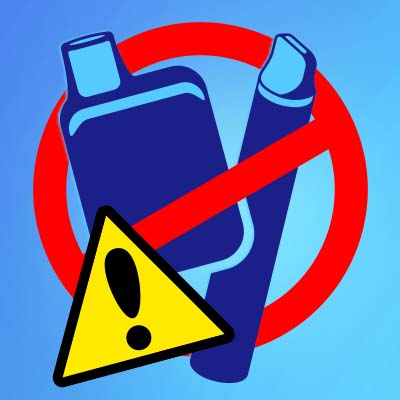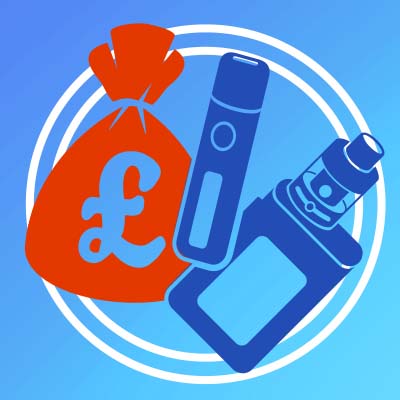Retail & Distributor Licensing Framework for the Vape Sector
As the debate rages on in the UK regarding the impact of illegal vapes and underage sales, it’s clear something needs to be done.
The government is already considering the introduction of lots of punitive laws and changes, and even an outright ban on disposable vapes, because of these threats. However, the UK already has very good vaping regulations, but unfortunately, they are not being enforced. Just creating new regulations won’t stop rogue traders and criminals from continuing to break the law. There is already a major concern that the disposable ban and any future restrictions, under the current climate, will only cause a huge boom for the already-thriving black market, which will serve to compound the situation.
The best deterrent for any crime is the real risk that you will be caught and of course, a suitable punishment will be imposed, that’s large enough to make it a risk not worth taking.
Many vape businesses, industry bodies and advocates have been championing the idea of a vape licensing scheme for years, and recently even some MPs have been calling for licensing in parliament. However, no such framework has ever been created, so we decided the best thing we could do to help the conversation evolve, was to actually create a blueprint for what vape licensing could look like.
Essentially, under this new scheme, eligible retailers and stockists will be able to apply for a licence that gives them authority to sell vape products to businesses and the wider public, and in doing so, commit to following the rules and regulations laid out within the scheme. The fee collected from licence holders will be used to support Trading Standards operations, including regular test purchases to assess age verification processes, and stock inspections to ensure they only sell legal products.
How Does The Scheme Tie Into Current Events?
Results from the government’s 2023 consultation into vapes revealed that a number of businesses welcomed the idea of a licensing scheme. However, the government turned down the prospect, citing that it would create a “burden” for local businesses and local authorities – when in fact it was legitimate businesses that were asking for it.
The real “burden” comes from unreputable companies that sell products to children and/or sell illegal products, which undermine the legitimate industry and cause moral outrage and danger to the public - and get away with it Scot-free. These activities are not only morally corrupt, but they fuel the debate around restrictions on things like vape flavours – which are vital to the success of vaping as a harm-reduction tool and must be protected.
More than this, it’s a “burden” that every time you switch on the TV or open a newspaper the vape industry is demonised, you’re told that we’re evil and want to create a new generation of vapers – all we want to do is help existing adult smokers and offer them a less harmful alternative.
Why Do We Need a Licensing Scheme?
A proper licensing scheme is the logical next step in legitimising the vape industry, restoring public trust and taking rogue traders off the board.
It has been made abundantly clear that the existing legislation and enforcement model simply doesn’t work. Through a Freedom of Information request, we’ve been able to access data from over 150 counties across the UK and Ireland that shows just how lacking enforcement measures have been.
Of the 2,871 retailers who were caught either selling illegal vapes or selling to children, only 139 were fined, with the average penalty amount sitting at only £2,019. This is frankly shocking and it is clear that rogue traders are acting with relative impunity and more needs to be done to shut them down.
At the same time, the media is awash with largely uncredited statements about the effects of vaping. The industry’s reputation is already under fire and the number of illegal vapes entering the UK isn’t helping matters. From the same request, we’ve been able to discern that 1.57 million illegal devices were seized in 2023 alone.
We believe that the answer doesn’t lie in more legislation that restricts access to legal and harm-reducing products, but rather a model has to be promoted from within; a model that sees industry members take responsibility for the goods they’re selling and to whom, and to ultimately remove rulebreakers from entering the market in any capacity.
What Are The Framework’s Objectives?
- To create a sustainable and viable funding base for enforcement and inspection functions relating to the vape sector.
- To foster a more responsible and accountable sector by tackling key concerns and challenges such as youth access and illicit product sales.
- To better enable regulators and Trading Standards to enforce existing and future legislation proactively.
- To reinstate trust in the legitimate vape sector and enable vaping to fulfill its full potential in helping the UK hit its smoke-free 2030 ambition.
Who Has Been Consulted?
While we may have spearheaded this new legislation model, we’re by no means its only architect. We did not want this just to be our views, so we consulted with a variety of Industry experts, business owners and Trading Standard officials to create a fully formed blueprint for the future of vape licensing.
That being said, we by no means expect this to be perfect. We’ve done the best we can, interviewed a lot of stakeholders and taken note of a lot of opinions. We’re open to discussing how it works and how it’s implemented. But, we thought it was important to start this conversation and create a working model.
What Measures Have Been Recommended?
The framework can be broken down into sections:
Structure & Funding outlines who would be eligible for a licence under the new scheme, how applications are processed, fee amount and collection, as well as how funds will be allocated once collected.
Compliance Requirements cover exactly what licence holders will be responsible for, including preventing youth access, best practices for product quality control, marketing and advertising practices, and obligations relating to the environment.
Penalties & Enforcement maps out the different offence categories, the penalty fee structure, licence revocation and reapplication, as well as enforcement mechanisms and protocols for inspections.
Governance & Oversight lists processes for establishing administrative and governing bodies as well as their duties. It also recommends responsible authorities who can comment on applications and licences.
A Model For Distributors who, while not selling directly to the public, bear responsibility for ensuring that only legal products, registered with the MHRA, reach UK vapers.
Next Steps where it’s explained exactly how decision-makers will be contacted and the actions that need to be taken to ultimately introduce this model into law.
What Outcomes Will Be Achieved?
The overall goal is to create a safe environment for retailers and stockists to operate within and for customers to purchase from, while at the same time ensuring that regulations are properly enforced with the funding to do so. It is through these measures that we will be able to prevent youth access, ensure all products are legitimate, protect public health and restore the good name of vaping. This will mean that we can avoid heavy-handed legislation that restricts adult vapers from accessing legal and proven products which are at risk from moves like flavour bans.
The revenue generated by this licensing scheme will be particularly appealing to the UK government. It’s estimated that the total annual funds from fees alone (not including fines) would amount to £50,000,000 annually – which is still a conservative estimate. This far exceeds the government’s one-off pledge of £30,000,000 and also removes the burden from the taxpayer and places it back onto the industry. Any remaining funds could be used to help support government initiatives, such as youth education programs around the dangers of smoking and vaping, vape recycling schemes, or simply to bolster NHS stop smoking services.
What’s Next?
This legislation framework has been distributed to key lawmakers including MPs, health experts and peers in the House Of Lords as we move towards officially launching this framework at the Houses of Parliament. By choosing to launch the report at Parliament, we hope to generate political momentum and secure commitment from key stakeholders.
Share This Article




